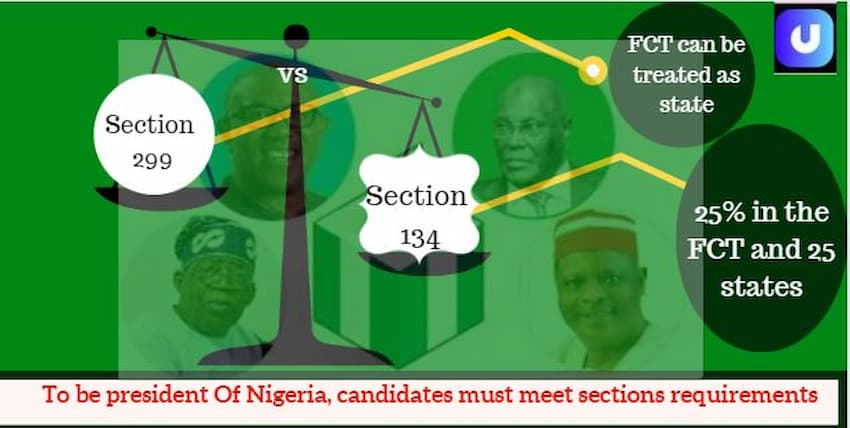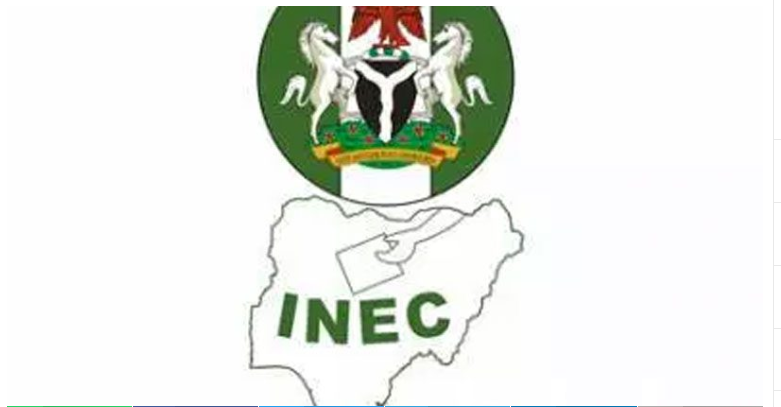The questions about explaining the clauses, 25% in the FCT And 24 States’ Requirements for winning presidential and governorship elections in Nigeria as well as if the FCT can be treated as a state among the whole Nigerian states leave Nigerians demanding to know what then would be two-thirds (2/3) of 36 or 37 (FCT) states in Nigeria.
READ: BVAS Voting Technology By INEC Has Many Loopholes
This explanation is to see if any of the candidates of the political parties – Labour Party, PDP and APC’ – Peter Obi, Atiku, Tinubu- respectively, have met the requirements so far.
This is because, the Independent National Electoral Commission (INEC) has already announced presidential election results from at least, 13 states while results from the FCT, though not yet officially announced by INEC, but circulated on social media by some persons, suggest that only the Labour Party Candidate, Peter Obi won the FCT.
READ: Election Results By States: Tinubu, Obi, Atiku, Kwankwaso Win States
If this becomes the case, proponents are arguing that while only Peter Obi may be declared winner in accordance with that stipulation of the constitution, other candidates such as Tinubu, Atiku, Kwankwaso and others will be disqualified.
However, opponents have equally found sections of the law to dispute this claim. According to them, section 299 rubbishes the claim that is in favour of Obi wherein it states that the FCT can be treated as one of the states of the federation.
This, according to them, means that if the FCT can be treated as one of the Nigerian states, then it does not matter if by winning 25% of the total number of states, a candidate must win the FCT or not.
To validate both sides of the argument, a video interview of former INEC REC, Mike Igini and that of a legal practitioner, Femi Falana (SAN) explaining the clauses are presented below.
READ: ChatGPT Predicts Who Wins Nigeria Election Among Peter Obi, Tinubu, Atiku, Kwankwaso
Meanwhile, another salient question finally remains: What interpretation would the Supreme Court give about what two-thirds (2/3) of the states means if the FCT is treated as a state. This is because, if the FCT should be treated as a state, then Nigeria will then have 37 states instead of 36.
Consequently, what would constitute two-thirds (2/3) of 37 states?
Meanwhile, in tis report, we bring you all the above including, specifically, the constitutional explanation of the clauses.
We also bring to you the following subtopics:
In a Glance:
…Section 299 of the constitution explained
…Section 134 explained
…25% in the FCT explained
…25% in 24 states explained
…Inconclusive election explained
… Six geopolitical regions and winners so far
Nigerians are currently debating this constitutional requirements as they are looking for clearer explanations of the clauses.
The Nigerian constitution says that, among other requirements, a candidate in an election must score at least 25% votes in at least two thirds (24 states out of 36 states) and the FCT and also win the majority votes in the entire votes cast in the 36 states of the country and the FCT.
READ: Has CBN Shutdown Opay, Kuda, PalmPay, Other Digital Banks?
Former INEC Resident Electoral Commissioner, Mike Igini, explained this clause saying thus:
25% in the FCT is compulsory. You can cuss from now till forever, 25% is mandatory. With all your rigging, you still failed in FCT. pic.twitter.com/JnYvHacDhO
— NEFERTITI (@firstladyship) February 28, 2023
However, in a previous television interview just before February 25th, 2023 general election, Senior Advocate of Nigeria (SAN), Femi Falana, explained the 25% in the FCT as well as if a candidate must win the FCT or not.
Mr Falana also said that the constitution stipulates that the FCT should be treated as a state. Therefore, he said if a candidate meets the 25% requirement, whether such candidate wins the FCT or not, such a candidate can be declared winner.
Section 299 of the Nigerian Constitution is EXPLICIT: “The provisions of this Constitution shall apply to the Federal Capital Territory, Abuja as if it were one of the States of the Federation.”
“Once a candidate gets 25% of votes in 24 states and has a majority of the total votes, he or she should be declared winner by the electoral body.”
~Femi Falana on Channels Television’s Sunrise Daily programme on January 24, 2023.— Abdulkareem Ibraheem (@OpeyemiAbdulka3) February 28, 2023
Listen to Femi falana saying PETER OBI won Abuja and should be declared the winner of #electionresults2023 🤦🤦🥵 pic.twitter.com/Xhy7JL1YvL— we no dey give shi-shi🎈 😂 🇳🇬 (@akomscopy) February 28, 2023
Also, in section 299, the constitution also states that the provisions of the constitution shall apply to the FCT and treat FCT as if it were one of the states in the country.
What this part of the clause means is that, by the section 299 of the constitution of Nigeria, the FCT can be treated as a state in Nigeria in some circumstances, one of which could be such as this election case.
The special assistant to president Muhammadu Buhari on Digital and New Media, Tolu Ogunlesi tweeted thus:
Section 299 of the Nigerian Constitution is EXPLICIT: “The provisions of this Constitution shall apply to the Federal Capital Territory, Abuja as if it were one of the States of the Federation.”
So, in this election matter, FCT shall be treated as one of 37 States.
Selah. pic.twitter.com/jbGQrovcYi
— tolu ogunlesi (@toluogunlesi) February 28, 2023
He said Section 299 of the Nigerian Constitution is EXPLICIT: “The provisions of this Constitution shall apply to the Federal Capital Territory, Abuja as if it were one of the States of the Federation.”
It is not a requirement that you must win the
FCT. The courts have ruled that pursuant to Section 299 of the constitution, that the FCT should be treated as a state. That is the law.
You don’t have to win the FCT. If you meet the requirement; that is two-thirds of the majority— GIDADO (@ag_dauda) February 28, 2023
So, in this election matter, FCT shall be treated as one of 37 States.
Selah. pic.twitter.com/jbGQrovcYi
— tolu ogunlesi (@toluogunlesi) February 28, 2023
However, opponents to this interpretation of section 299 pose their defense. See tweets below.
The court in Bakare v Ogundipe (2021) 5 NWLR (Pt 1768) 1 SC ruled that pursuant to Section 299 of the constitution, that the FCT should be treated as a state.
(credits on the case belongs to Dr. @yekinilaw1)
— Aziz Bakare (@Backarray) February 28, 2023
Also, another tweep tweeted thus:
APC are try to misinterpret Section 299 to mean FCT is treated as one of the states meaning 25% in 25 states is enough. WRONG! Same Section 299 says the president is the governor of Abuja. So Section 134 says you must get 25% acceptance in your ‘home’ state. Like Rome to the Pope pic.twitter.com/AYj144Amw2
— PeterObi=Competence+Integrity+Equity (@Balatic) February 28, 2023
That calculation leads the 24 states. The second layer is the FCT. If you lump the FCT to become 37th state, how do we arrive at a definitive conclusion of 2/3 of 37. This is how I see it.
— Kevwe LP (@Khevs_O) February 28, 2023
It is this second limb I argue that we are not paying attention to, in view of Section 299 which makes FCT a state for the purpose of the Constitution. SC has to tell us what constitutes 2/3 of 37. https://t.co/9gZlgBKlNf
— Dr Great Oracle (@AbdulMahmud01) February 28, 2023
However, while the debates about the sections of the constitution heat up further, the confusion about the clauses increases.
This report, therefore, looks into the section 299 of the constitution, the 25% in the FCT And 25% in 24 States Requirements to know if the candidates or any of the candidates have met the requirements so far.
READ: Loan Apps In Nigeria: List Of Govt Only Approved Ones
The report equally draws validation from the explanations of the clauses as given by former INEC Resident Electoral Commissioner (REC), Mike Igini as well as from legal practitioner, Femi Falana (SAN) and from explanations from other legal experts.
What the constitution says:
According to the Electoral Act (2022), a winner of the presidential election must meet the provisions of section 134 of the Nigerian Constitution.
The section 134 of the constitution partly states thus:
“In an election to the office of the President or Governor whether or not contested and in any contested election to any other elective office, the result shall be ascertained by counting the votes cast for each candidate and subjected to the provisions of sections 133, 134 and 179 of the Constitution.”
Implications:
What sections 133, 134 and 179 of the Constitution Say About Winning:
The sections of the 1999 Constitution say that a presidential candidate must win a simple majority votes and a second requirement which is winning a two-thirds (2/3) per cent (25% in at least 24 states out of 36 states) and the FCT.
So, what this means is that such a candidate, to emerge winner, must not only win a single majority but must also win a stipulated 25% in at least 24 states and the FCT.
Scoring 25% in at least 24 states is the direct meaning of the clause , “at least two-third (2/3) of the total votes cast in all the 36 states.” The addition, “and the Federal Capital Territory (FCT)” needs to be fully interpreted by, including the Supreme Court of Nigeria for clarity.
So, by implication, it means that candidates of the Labour Party, PDP, APC, NNPP, or any bother candidate who contested the 2023 presidential election must win at least 25% votes from 24 states and the FCT, and also win the highest number of votes among the other candidates to emerge winner.
The candidate must score the highest number of votes more than other candidates and the votes must be from across the country and regions, including the FCT.
Regions in Nigeria And Winners So Far:
Based on the results of 13 states that INEC has announced, below are regions the states fall into and the winners among the candidates.
There are six region in Nigerian under which the 36 states of the country fall into.
The regions are:
South West
(1) Lagos – LP
(2) Oyo – – APC
(3) Ondo. – APC
(4) Ogun – APC
(5) Osun – PDP
(6) Ekiti – APC
South South
(7) Edo
(8) Delta
(9) Akwaibom.
(10) Rivers.
(11) Cross Rivers.
(12) Bayelsa.
South East
(13) Anambra.
(14) Enugu – LP
(15) Imo.
(16) Abia
(17) Ebonyi.
North Central
(18) Benue.
(19) Plateau.
(20) Nasarawa.
(21) Kwara. – APC
(22) Niger.
(23) FCT
(24) Kogi.
North West
(25) Kano.
(26) Jigawa. – APC
(27) Katsina. – PDP
(28) Sokoto.
(29) Kebbi.
(30) Zamfara.
(31) Kaduna.
North East
(32) Adamawa. – PDP
(33) Gombe. – PDP
(34) Taraba.
(35) Bauchi.
(36) Borno.
(37) Yobe. – PDP
Inconclusive Election:
In Nigeria, INEC can declare an election inconclusive if no political candidate was able to meet the electoral requirements for emerging winner of the election.
The constitution stipulates that in an event no candidate was able to score 25% of the votes from at least 24 states and the FCT, then INEC can declare the election inconclusive.
Also, if no candidate gained the highest votes, the election can be inconclusive too.
What Happens If Election Is Inconclusive?
The Nigerian constitution dictates what happens if the election becomes inconclusive and this is explained in section 134.
Section 134:
Section 134, Subsections 3/4/5 states as follows:
“In a default of a candidate duly elected in accordance with subsection (2) of this section their shall be a second election in accordance with subsection (4) of this section at which the only candidate shall be:
(a) The candidate who scored the highest number of votes at any election held in accordance with the said subsection (2) of this section; and
(b) One among the remaining candidates who has a majority of votes in the highest number of States, so however that where there are more than one candidate with majority of votes in the highest number of States, the candidate among them with the highest total of votes cast at the election shall be the second candidate for the election.
“In default of a candidate duly elected under the foregoing subsections, the Independent National Electoral Commission shall, within seven days of the result of the election held under the said subsections, arrange for an election between the two candidates;
“And a candidate at such election shall be deemed elected to the office of President if:
(a) He has a majority of votes cast at the election; and
(b) He has not less than one-quarter of the votes cast at the election in each of at least two-thirds of all the States in the Federation and the Federal Capital Territory, Abuja.
“In default of a candidate duly elected under subsection (4) of this section, the Independent National Electoral Commission shall, within seven days of the result of the election held under the aforesaid subsection (4), arrange for another election between the two candidates to which the subsection relates and a candidate at such election shall be deemed to have been duly elected to the office of President, if he has a majority of the votes cast at the election.”
Following both arguments, the question therefore remains to be answered by the Supreme Court about the interpretation of what two-thirds (2/3) of 36 or 37 states means. That way, we can know when any of the candidates truly has fully met the electoral requirements.



















 and then
and then